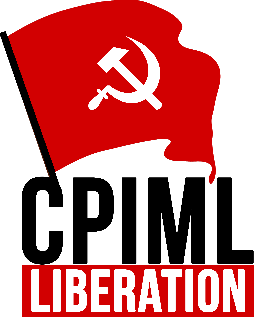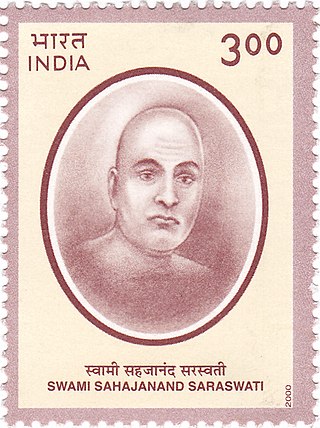Related Research Articles

The Communist Party of India (Marxist–Leninist) Liberation (abbreviated: CPI(ML) or CPI-ML or CPIML(L) or CPI-ML(L) or CPIML Liberation) also referred to as the Liberation Group, is a Communist political party in India.
Dalit Mazdoor Kisan Party is an Indian political party founded in 1984 by the remains of the Lok Dal. The DMKP was mainly based in Uttar Pradesh. It was led by former Prime Minister Charan Singh. It was founded on 21 October 1984. It was merger of Charan Singh's Lok Dal, Democratic Socialist Party of Hemwati Nandan Bahuguna, Rashtriya Congress of Ratubhai Adani and some members of Janata Party like Devi Lal. Later it changed its name to the Lok Dal.

All India Kisan Sabha, is the peasant or farmers' wing of the Communist Party of India, an important peasant movement formed by Sahajanand Saraswati in 1936.

The history of Bihar is one of the most varied in India. Bihar consists of three distinct regions, each has its own distinct history and culture. They are Magadh, Mithila and Bhojpur. Chirand, on the northern bank of the Ganga River, in Saran district, has an archaeological record from the Neolithic age. Regions of Bihar—such as Magadha, Mithila and Anga—are mentioned in religious texts and epics of ancient India. Mithila is believed to be the centre of Indian power in the Later Vedic period. Mithila first gained prominence after the establishment of the Videha kingdom. The Kings of the Videha Kingdom were called Janakas. A daughter of one of the Janaks of Mithila, Sita, is mentioned as consort of Lord Rama in the Hindu epic Ramayana, written by Valmiki. The Videha Kingdom later became incorporated into the Vajjika League which had its capital in the city of Vaishali, which is also in Mithila.

Sahajanand Saraswati (pronunciation was an ascetic, a nationalist and a peasant leader of India. Although born in United Provinces, his social and political activities focussed mostly on Bihar in the initial days, and gradually spread to the rest of India with the formation of the All India Kisan Sabha. He had set up an ashram at Bihta, near Patna ,Bihar carried out most of his work in the later part of his life from there. He was an intellectual, prolific writer, social reformer and revolutionary.
Neyamatpur is a village in Gaya district of Bihar, India. The village was a bastion of the Indian National Congress and Kisan Andolan during the British period. "Pandit" Yadunandan Sharma, at the instruction of Swami Sahajanand Saraswati established an ashram here in 1933.

Yogendra Shukla was an Indian nationalist and freedom fighter from Bihar. He served in the Cellular Jail, and he was among the founders of Hindustan Socialist Republican Association (HSRA). Along with Basawon Singh (Sinha) he was among the founder members of the Congress Socialist Party from Bihar.
A peasant movement is a social movement involved with the agricultural policy, which claims peasants rights.
Bhumihars, also called Babhan, are a Hindu caste mainly found in Bihar, the Purvanchal region of Uttar Pradesh, Jharkhand, the Bundelkhand region of Madhya Pradesh, and Nepal.
Jamuna Karjee (1898-1953) was an Indian independence activist.
Yadunandan Sharma (1896–1975) was an Indian peasant leader and national liberation figure from the Indian state of Bihar. He had started a movement for the rights of tillers against the zamindars and Britishers at Reora celebrated as the Reora Satyagraha.
Karyanand Sharma (1901–1965) was a nationalist and peasant leader who led movements against zamindars and the British.
The Kamgar Kisan Paksha was a political party in Bombay State, India. The party was formed by a group of dissidents from the Peasants and Workers Party of India in November 1951, just before the 1951-1952 elections. The founders of Kamgar Kisan Paksha wanted closer cooperation with the Communist Party of India. Its main leaders were Nana Patil, Datta Deshmukh and D.S. Wagh.
Nurul Huda was an Indian politician, former Member of Parliament and former Member of the Legislative Assembly of Assam. A leader of the Communist Party of India (Marxist), Nurul Huda belonged to the Central Committee of the party.
Balkrishna Sharma was an Indian politician. He was a leader of the Communist Party of India and the Kisan Sabha. Sharma was active in organising peasants movement in northern Madhya Pradesh for various decades. Together with other CPI leaders such as Khan Shakir Ali Khan he organised occupations of estates of ex-princes and other large landowners. As of 1973 he was a member of the Central Kisan Committee, the national leadership of the All India Kisan Sabha.
Uddaraju Ramam was an Indian politician. He was a parliamentarian and a leader of peasants movement. He has three sons and two daughters,
The Lok Sewak Sangh, or Manbhum Lok Sewak Sangh, was a political party in Purulia District, West Bengal, India. LSS was founded in 1948. The party was the main political force in Purulia District from the independence of India until the fall of the second United Front cabinet.
The Kisan Mazdoor Mandal was a political party in Bhopal State, India. The party was formed in 1950 by proponents of a merger with Madhya Bharat, who split away from the Indian National Congress. The party had a Marxian orientation. KMM was supported by the 10,000-member trade union Mazdoor Sabha. Khan Shakir Ali Khan was the president of KMM. In the run-up to the 1952 Bhopal Legislative Assembly election, KMM was the main opposition to the Bhopal Congress.
Sunil Mukherjee was an Indian politician and leader of Communist Party of India. He was the founder secretary of Communist Party of India Bihar unit.

Ganesh Shankar Vidyarthi was an Indian independence activist and politician from Nawada district in the state of Bihar. He was elected to the Bihar Legislative Assembly for two terms and he was a Member of the Bihar Legislative Council for one term. He joined the Communist Party in 1942 and went on to become the State Secretary of the Communist Party of India (Marxist) as well as a member of its national Central Committee. He went to jail multiple times for a total of six years both before Independence and after due to his political participation. He was fondly called Ganeshda.
References
- ↑ Ramchandra Pradhan (25 September 2018). The Struggle of My Life: Autobiography of Swami Sahajanand. OUP India. p. 425. ISBN 978-0-19-909655-8.
- 1 2 3 Arvind N. Das (1982). Agrarian Movements in India: Studies on 20th Century Bihar. Psychology Press. p. 15. ISBN 978-0-7146-3216-2.
- 1 2 3 Indian History Congress (2000). Proceedings. Indian History Congress. p. 835.
- ↑ M. M. Sankhdher (1983). Framework of Indian Politics. Gitanjali Publishing House. p. 286.
- 1 2 Gupta, Rakesh Kumar. Peasant struggles : a case study of Bihar
- ↑ Walter Hauser; William R. Pinch; University of Virginia. Center for South Asian Studies (30 June 2008). Speaking of peasants: essays on Indian history and politics in honor of Walter Hauser. Manohar Publishers & Distributors. p. 210. ISBN 978-81-7304-746-6.
- ↑ Dipankar Bhattacharyya (1992). Peasant movements in Bengal and Bihar, 1936-47. Rabindra Bharati University. p. 209.
- ↑ Walter Hauser (22 February 2019). The Bihar Provincial Kisan Sabha, 1929-1942: A Study of an Indian Peasant Movement. Taylor & Francis. p. 243. ISBN 978-1-00-000722-0.
- ↑ Vinita Damodaran (1992). Broken promises: popular protest, Indian nationalism, and the Congress Party in Bihar, 1935-1946. Oxford University Press. p. 310.
- 1 2 Jan Breman (2007). Labour Bondage in West India: From Past to Present. Oxford University Press. pp. 154–155. ISBN 978-0-19-568521-3.
- ↑ Sadhna Sharma (1995). States Politics in India. Mittal Publications. p. 98. ISBN 978-81-7099-619-4.
- ↑ Election Commission of India. STATISTICAL REPORT ON GENERAL ELECTIONS, 1951 TO THE FIRST LOK SABHA
- 1 2 3 Election Commission of India. Bihar 1951